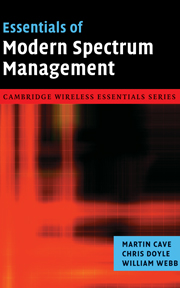Book contents
- Frontmatter
- Contents
- Acknowledgements
- I Emerging problems with the current spectrum management approach
- II Markets
- III Regulation
- 11 Incentive based spectrum prices: theory
- 12 Incentive based spectrum pricing: practicalities
- 13 How the commons works
- 14 Commons or non-commons?
- 15 Is public sector spectrum management different?
- 16 Are developing countries different?
- IV Conclusions
- Further reading
- Abbreviations
- Author biographies
- Subject index
- References
12 - Incentive based spectrum pricing: practicalities
Published online by Cambridge University Press: 13 August 2009
- Frontmatter
- Contents
- Acknowledgements
- I Emerging problems with the current spectrum management approach
- II Markets
- III Regulation
- 11 Incentive based spectrum prices: theory
- 12 Incentive based spectrum pricing: practicalities
- 13 How the commons works
- 14 Commons or non-commons?
- 15 Is public sector spectrum management different?
- 16 Are developing countries different?
- IV Conclusions
- Further reading
- Abbreviations
- Author biographies
- Subject index
- References
Summary
Introduction
In 1993 the ITU recommended that in spectrum prices should follow a set of principles [1].
All spectrum users should pay a charge.
Non-discrimination – the spectrum charge should be calculated fairly, i.e. if two users are using the same amount of spectrum in the same way, both should pay the same charge.
The spectrum charge should be proportionate to the amount of bandwidth used.
The charges should reflect the spectrum's value to society, i.e. if need be, frequencies used for public services should be subject to lower charges.
The cost of spectrum regulation should not be borne by the state.
Spectrum users should be consulted about intended adjustments in spectrum charges.
The pricing structure should be clear, transparent and comprehensive, without unnecessarily lengthening the licensing process.
The pricing structure should reflect the scarcity of available spectrum and the level of demand for spectrum in different frequency bands.
The spectrum charge should be calculated so as to recover the costs of spectrum regulation. Spectrum pricing should not seek to maximise revenue for the government.
The ability to levy spectrum charges should be anchored in law.
As discussed in the previous chapter, the contemporary approach to the setting of incentive based spectrum prices places a greater emphasis on economic factors. While some of the principles above remain relevant to the setting of spectrum prices, the 1993 ITU recommendations contain contradictions. For example, it is generally not possible to set spectrum prices to reflect scarcity while at the same time recover only the administrative costs of regulating spectrum.
Information
- Type
- Chapter
- Information
- Essentials of Modern Spectrum Management , pp. 187 - 202Publisher: Cambridge University PressPrint publication year: 2007
